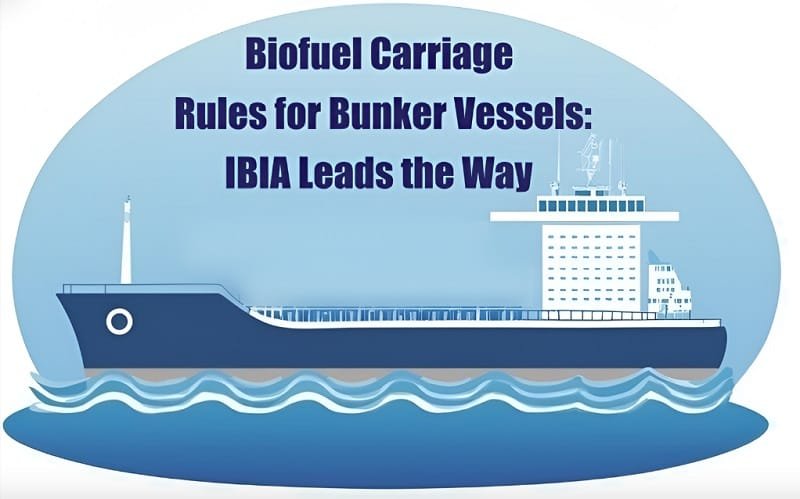The International Bunker Industry Association (IBIA), the voice of bunker industry, has successfully driven a key regulatory change that will facilitate the wider adoption of biofuels in the maritime sector. The IMO’s Sub-Committee on Pollution Prevention and Response (PPR 12) has agreed to draft Interim Guidance that will allow conventional bunker vessels to transport higher biofuel blends, marking a crucial step in supporting the decarbonization of global shipping.
Table of Contents
The Regulatory Challenge and IBIA’s Role
In November 2023, IBIA submitted a document to the International Maritime Organization (IMO) highlighting a significant regulatory barrier to the use of biofuels as marine fuel. Under existing regulations, conventional bunker vessels could only transport biofuel blends with a maximum of 25% bio-content, limiting supply capabilities and slowing the transition to low-carbon shipping fuels. This restriction was seen as an obstacle to achieving the 2023 IMO Greenhouse Gas (GHG) Strategy, which aims to cut carbon emissions from international shipping.
Recognizing this, IBIA played a pivotal role in advocating for regulatory adjustments, leading to the agreement by PPR 12 to draft new Interim Guidance. This guidance will increase the permissible biofuel blend limit to 30% by volume for bunker vessels certified under MARPOL Annex I. A key condition is that any tank residues or washings must be discharged ashore, unless the vessel’s Oil Discharge Monitoring Equipment (ODME) is approved for the biofuel blend in question. The new guidelines are expected to receive final approval from the IMO’s Marine Environment Protection Committee (MEPC 83) in April 2024.
The Role of Biofuels in Maritime Decarbonization
Biofuels are an essential component of the maritime sector’s transition towards sustainable energy solutions. As the industry seeks alternatives to fossil fuels, biofuels offer an immediate pathway to reduce carbon emissions without requiring major modifications to existing ship engines or infrastructure. Unlike fossil fuels, biofuels—particularly second-generation and advanced biofuels—are produced from renewable sources such as waste oils, agricultural residues, and non-food biomass, making them a viable option for carbon reduction in shipping.
However, logistical challenges, including regulatory restrictions on transport and storage, have hindered the scalability of biofuel adoption. By pushing for this regulatory adjustment, IBIA is ensuring that bunker vessels can supply larger volumes of biofuels to ships, supporting shipowners and operators in meeting their decarbonization targets.
IBIA’s Commitment to Industry Advancement
IBIA’s successful advocacy underscores its critical role as the voice of the global bunker industry. Representing stakeholders across the marine fuel supply chain, IBIA continues to work closely with the IMO and other regulatory bodies to shape policies that facilitate the energy transition.
By leveraging its technical expertise and consultative status at the IMO, IBIA ensures that key industry challenges are addressed at the highest regulatory levels. With the upcoming approval of the Interim Guidance at MEPC 83, the industry is set to take another step towards a more sustainable future for marine fuel supply.
About The International Bunker Industry Association (IBIA)
The International Bunker Industry Association (IBIA), established in October 1992, represents the global bunker industry across all sectors and the entire value chain. IBIA advocates for the interests of bunker suppliers, traders, brokers, shipowners, port authorities, charterers, P&I clubs, and marine consultants.
With consultative status at the International Maritime Organization (IMO), IBIA actively promotes higher industry standards, best practices, and regulatory improvements while fostering collaboration to address the challenges and opportunities in the bunker industry. The association plays a key role in educating industry stakeholders and shaping the future of the marine fuel sector, ensuring the common good and supporting sustainable growth.
IBIA’s headquarters are in the UK, with offices in South Africa and Singapore, enabling the association to engage with industry leaders globally.

